By Steve Horn, a San Diego, CA-based climate reporter and producer for The Real News Network, who has worked as a staff investigative reporter for the publications Prison Legal News and Criminal Legal News and works as the Escondido reporter for The Coast News Group’s Inland Edition in northern San Diego County. He worked from 2011-2018 as an investigative reporter for the climate and environmental news website DeSmog.com, and as a reporter and researcher for the Center for Media and Democracy’s PR Watch prior to that. Originally published by The Real News Network.
The oil and gas industry has started its 2019 lobbying efforts with a bang.
Eight different statehouses across the nation are considering bills criminalizing protests on property owned by the the oil and gas industry which critics say could squelch pipeline protesters and others calling attention to climate change-causing infrastructure.
The bills offer steep criminal penalties for trespass onto oil and gas industry-owned private property defined as “critical infrastructure” under state law. The legal definition of “critical infrastructure,” which incorporates essentially all assets serving as the bedrock of the current economic system, has greatly expanded in the post-September 11 era. With that expansion came increasingly harsh criminal enforcement mechanisms available to prosecutors in the name of protecting national security.
It is no coincidence that the bills are rolling out simultaneously with nearly identical language, in various states. The Real News has traced these bills back to model bills emanating from two organizations, the American Legislative Exchange Council (ALEC) and the Council of State Governments (CSG), both of which receive generous financial backing from the oil and gas industry. In turn, the organizations serve as facilitators for doling out model legislation to state legislators.
Critical infrastructure bills of this sort, first passed in statehouses in early 2017 following the mobilization at the Standing Rock reservation in North Dakota, have been taken up by both ALEC and CSG for use as model legislation.
In the first month of the year, Indiana, Wyoming, Illinois, Mississippi, Pennsylvania, North Dakota, Idaho, and Ohio have all taken this template-based model legislation under consideration, which mirrors two bills passed in Oklahoma in 2017. Sandwiching them together as one, ALEC created the Critical Infrastructure Protection Act at one of its annual meetings held in December 2017. And the lobbyists and legislators involved in the organization in the room that day gave it a “yes” vote.
ALEC is a corporate-backed organization of state legislators and lobbyists; its membership base mostly consists of Republican members of state legislatures. It convenes three times per year for educational panel sessions, networking, and to vote on model bills. Those model bills then get distributed to state legislators nationwide, often becoming state law.
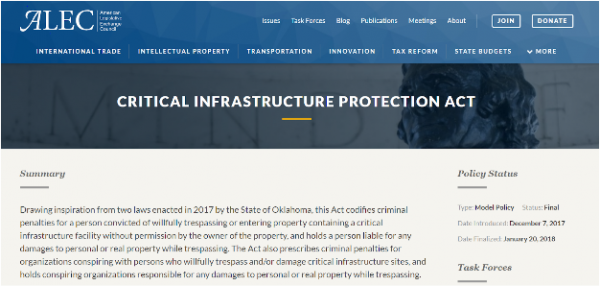
Just a week after ALEC’s Critical Infrastructure Protection Act was approved, the Council of State Governments (CSG), another corporate-funded organization, also adopted the same Critical Infrastructure Protection Act as model legislation, or what it calls Shared State Legislation. Like ALEC’s model bills, CSG also distributes its Shared State Legislation to statehouses across the country. But unlike ALEC, CSG has a bipartisan membership base and its general budget receives funding largely from taxpayers.
The ALEC and CSG model legislation calls for criminal punishment in the form of incarceration or heavy fines for those who “willfully and knowingly trespass or enter property containing a critical infrastructure facility without permission by the owner of the property.” It also allows for conspiracy charges to be brought against “persons who are found to have committed any of the crimes.”
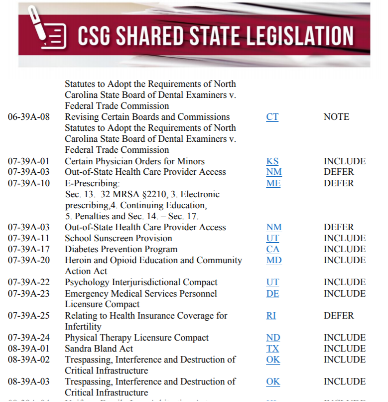
Under the original Oklahoma bills, anyone who trespasses on critical infrastructure can face up to six months in jail and up to a $1,000 fine. If the state can prove intent to damage the property, individuals can be fined up to $10,000 and face a year in prison. And for actually damaging property, protestors can face up to 10 years in prison and be fined up to $100,000. Co-conspirators can see fines of up to $1 million.
In 2017, North Dakota, South Dakota, and Oklahoma all saw like-minded legislation pass, with the two pieces of Oklahoma legislation taken up as the gold standard by ALEC and CSG. Iowa and Louisiana both passed the model bill. Ohio considered the bill in 2018, but it did not pass; it’s been taken up again in 2019. In Wyoming and Minnesota the model bills advanced to the desks of their respective governors, but both received a veto.
CSG receives funding from companies such as Koch Industries, Chevron, ExxonMobil, and Marathon Petroleum, as well as industry trade association groups like American Fuel and Petrochemical Manufacturers, American Chemistry Council, Edison Electric Institute, and American Gas Association. ALEC’s corporate funders include or have included the likes of Koch Industries, ExxonMobil, Energy Transfer Partners, Shell, and a long list of others.
Critics of the legislation have previously told The Real News that even if does not pass, its introduction creates a chilling effect for frontline activists who commit acts of civil disobedience in defiance of industry projects like pipelines and refineries.
“[The legislation] is going to create a real chill around the communities, the environmental communities, the civil rights communities, and others who are fighting against the pipeline and these energy things,” Bill Quigley, a professor at Loyola University New Orleans, told The Real News in a 2018 interview about the legislation in Louisiana. “This [is] criminalizing of dissent [and] criminalizing of alternative views. Again, the private for-profit oil companies are trying to force the state to use its powers to inhibit and clamp down on the First Amendment rights of people who are looking for ways to try to stop the pipelines.”
In advance of the ALEC meeting in December 2017, Marathon Petroleum, American Chemistry Council, Edison Electric Institute, American Fuel & Petrochemical Manufacturers, and American Gas Association all wrote a letter to the state legislators informing them that ALEC’s Energy, Environment, and Agriculture Task Force would consider the model bill at the forthcoming meeting.
“Energy infrastructure is often targeted by environmental activists to raise awareness of climate change and other perceived environmental challenges. These activities, however, expose individuals, communities, and the environment to unacceptable levels of risk and can cause millions of dollars in damage,” they wrote in the letter, obtained and published by The HuffPost. “This model policy would help safeguard our nation’s critical infrastructure, while also holding individuals and organizations accountable for tampering with, and disrupting operations.”
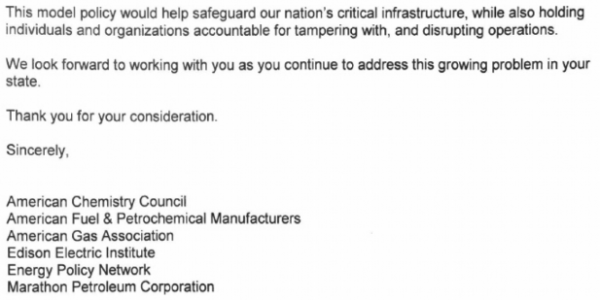
Connor Gibson, a researcher with Greenpeace USA’s investigations team, provided research for this article, a trove of which is published on the blog PolluterWatch. Gibson, a longtime watchdog of ALEC, pointed to the contradiction of Koch Industries funding ALEC while also nominally supporting federal criminal justice reform.
“ALEC legislators are out full force pushing bills to make felons out of peaceful protestors,” said Gibson. “Ironically, this is all happening while ALEC and Koch Industries are seeking credit for recent Congressional efforts to free nonviolent offenders from prison.”
Wyoming Comes and Goes
Wyoming, a state with heavy oil and gas industry presence and pipelines owned by companies like OneOK and TransCanada, was first out of the blocks in introducing the critical infrastructure legislation for the 2019 year. The state did so at the end of 2018 in the form of its HB 10. It was the state’s second attempt at passing the bill and, like the first time, it came to an end due to opposition within the Republican Party.
Two of the bill’s co-sponsors, Rep. Eli Bebout and Rep. Danny Eyre, pay dues as ALEC members. Bebout also sat on the CSG West Executive Committee for the 2017-2018 period. Senate bill sponsor Dave Kinskey, meanwhile, sat on the CSG West State and Federal Affairs Committee in 2018, while Drew Perkins sat as a CSG West Finance and Economic Development member in 2018.
The lobbying organization American Fuel and Petrochemical Manufacturers, of which Koch Industries subsidiary Flint Hills Resources is a member, was the organization which pushed the legislation. Lacking support from the Petroleum Association of Wyoming and coming under opposition by the state’s Native American tribes, the bill did not last long.
Other states have picked up the baton and ran with the legislation, including a few in the midwest.
Midwest Bills
Illinois, Ohio, and Indiana legislators have all introduced the model bills in their respective statehouses. At least two of them, in Illinois and Indiana, appear to have momentum.
In Illinois, a state which uses hydraulic fracturing (“fracking”) to obtain oil and gas in its southern tier, HB 1633 already has 14 co-sponsors—eight Democrats and six Republicans. On February 13, the bill was assigned to the House Judiciary Committee and received a hearing.
The Dakota Access Pipeline, owned by the company Energy Transfer Partners, ends in Illinois in the industry hub town of Patoka. So too does the TransCanada-owned Keystone Pipeline, as does a segment of the Canadian company Enbridge’s Illinois pipeline system. At the February 13 hearing, representatives for all three of those companies testified in support of the bill.
Three of the bill’s co-sponsors—Rep. Kelly Burke, Rep. Rep. Marcus Evans and Rep. Frances Ann Hurley—all have spent time in a leadership or training capacity within CSG. All three are Democrats.
Burke serves as both a member of CSG’s Great Lakes-St. Lawrence Legislative Caucus and sits on the Steering Committee of the CSG Midwest Bowhay Institute for Legislative Leadership Development (BILLD), while Evans served on the CSG Midwest Criminal Justice and Public Safety Committee during the 2017-2018 year. Hurley, for her part, attended the 2016 BILLD session overseen by CSG Midwest.
Indiana, Illinois’ eastern neighbor, also has seen its SB 471 move swiftly through the legislature. On February 7 it passed unanimously, 49-0, in the Indiana Senate.
The Senate bill sponsors, Eric Koch and Michael Crider, both have connections to ALEC. Crider signed an ALEC letter published by the U.S. Senate Judiciary Committee, urging then-U.S Supreme Court nominee Brett Kavanaugh to support it. Koch, on the other hand, has long maintained a membership connection to the organization as a dues-paying member.
The two of them, both Republicans, also have gotten involved with CSG.
Crider attended the 2015 BILLD, which is a CSG five-day academy of sorts, geared toward midwest-based state legislators. The 2015 version of BILLD, according to the Web Archive, had a sponsor list which included pipeline company titans TransCanada and Enbridge, as well as petrochemical trade association group American Chemistry Council.

Crider pictured with 2015 BILLD graduates, fifth row, right side, bald; Photo Credit: Council of State Governments
In an interview at the Indiana Statehouse, Crider denied any connection to ALEC, but did acknowledge his attendance at the CSG BILLD conference. He said he did not know this was a model bill for either of the two organizations. Crider formerly worked as the Director of Law Enforcement for the Indiana Department of Natural Resources and is a graduate of the FBI National Academy.
For his part, Koch attended an August 2016 CSG gathering in North Dakota, The Fundamentals of Natural Gas Policy Academy, which transpired during the early days of the Standing Rock uprising that exploded in the fall of that year. Officials present heard presentations given by representatives from a wide range of oil and gas industry players, including the industry-funded U.S. Energy Association, pipeline company Tesoro, American Fuel and Petrochemical Manufacturers, American Gas Association, and Piedmont Natural Gas.
Koch’s office did not make him available for repeated requests for comment for this story. Legislators from all of the other states which have proposed legislation also did not respond to requests for comment made via email.
In the interview with Crider, he maintained that he did not have concerns about potential First Amendment impacts of the legislation.
But he also said it’s ultimately up to courts to decide if it elevates to that level if a constitutional challenge is brought to the law on its face, or as-applied in action after a prosecution. He admitted, though, that the law’s mere existence on the books will likely stop many would-be activists in their tracks.
“Hopefully, the escalation of penalties makes it sure enough a deterrent that we won’t actually have one we have to try in court, that we have to try it,” said Crider. “So I think it’s, it’s one of those situations where, you know, we’re just trying to figure out.”
In Crider’s eyes, this is strictly an issue over protection of private property rights.
“From my perspective, if you have a private property situation with key critical assets on your property, then people who come on that property should be an invited guest, and once they’re on the property as invited guests then you don’t really have an expectation of privacy in that situation,” Crider explained. “I would say that, you know, once you have stepped on a property where somebody can articulate a reason for which—you either create a danger for yourself or for other members of the public [and for] the protection of commerce and the electric grid—if you can articulate that, then there’s clearly a reason why folks should be excluded from that property.”
Bowden Quinn, Director of the Hoosier Chapter of the Sierra Club, told The Real News that he sees the bill as an imminent threat for those doing environmental advocacy in the Hoosier State.
“You know, we were kind of thinking about trying to amend the bill to make it better at first,” said Quinn. “But our thought now is you can’t make this bill better. It’s a terrible bill. Its primary intent is to stifle free speech and public protests. And so we’re going to try defeat it.”
Quinn said he is also troubled by the “conspiring organization” language found within the bill.
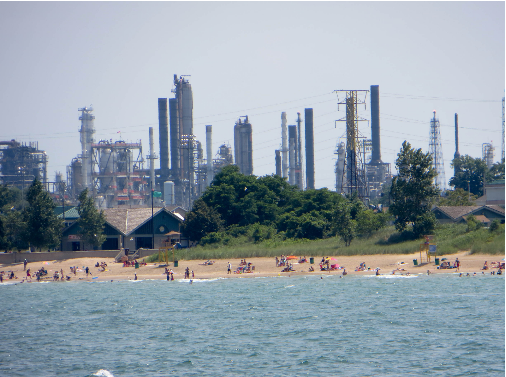
BP Whiting Refinery; Photo Credit: Wikimedia Commons
“There’s a big refinery in Whiting, Indiana, the BP Whiting facility. And a couple of years ago we engaged with groups up there who wanted to organize a protest because they really expanding the facility to be able to take tar sands,” Quinn explained. “And so our group up there was initially in the discussions, but it became clear that some of the groups involved wanted to do civil disobedience and Sierra Club’s bylaws in general forbid us to participate in civil disobedience, so we withdrew.”
The action ended up happening, Quinn said, and some faced arrest for blocking a road considered private property under the ownership of BP.
“You know, just because we had been in the initial discussions or if we had tweeted just to inform our members that this demonstration was going to take place, could we be found under the current language in that bill to be a conspiring organization?” Bowden asked rhetorically. “If you have a good prosecutor, then probably not, but if you have some prosecutor who’s, you know, got an axe to grind against environmental organizations or wants to curry favor with the petroleum industry, they could go a long way with this.”
The American Civil Liberties Union (ACLU) of Indiana has joined Indiana’s Sierra Club in opposing SB 471.
The Ohio legislation, newly introduced on February 12 as SB 33, has the same lead author as the 2018 version, Republican Senator Frank Hoagland, who is a dues-paying member of ALEC, according to documents filed with the Ohio Secretary of State’s office. Other co-sponsors, Senators Lou Terhar and Bill Coley, also sit as ALEC State Chairs. Four others—Senators Bob Peterson, Steve Wilson, Bob Hackett and Matt Hoffman—also pay their dues as ALEC members.
Ohio houses Energy Transfer Partners’ Rover Pipeline project and is a major producer of oil and gas obtained via fracking in the Utica Shale Basin.
Upper West Side
In the Great Plains and Mountain West, North Dakota and Idaho also have model bills under consideration.
North Dakota, ironically, had already passed multiple pieces of legislation in response to the Standing Rock protests, and passage of the ALEC and CSG model bill would only solidify already-passed state law. It would come in the form of SB 2044, a bill which passed through the Senate 42-3 on February 15 with two Republican co-sponsors, Sen. Janne Myrdal and Rep. Chuck Damschen. Myrdal is a registered ALEC member, while Damschen signed onto the ALEC letter sent to the U.S. Senate Judiciary Committee in support of Brett Kavanaugh’s nomination to the U.S. Supreme Court..
North Dakota serves as one of the most prolific fields of the U.S. oil fracking boom, home of the prolific Bakken Shale formation, and the origin point of the Dakota Access Pipeline. Its legislature has also proposed a bill which would exempt the state apparatus from open records requests concerning the interaction of protests and oil and gas industry-related critical infrastructure.
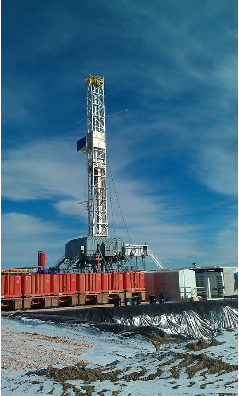
Fracking rig in the Bakken Shale; Photo Credit: Wikimedia Commons
Idaho has recently entered into the fold as well, introducing SB 1090 on February 11. It does not yet have a list of bill introducers or co-sponsors.
Show Me Down South
The “Show Me State,” Missouri, a state which houses the original TransCanada Keystone Pipeline, has also seen model bills move through its statehouse in the form of both HB 954 and SB 293.
In the deep south, Mississippi, too, introduced the bill. Introduced by Democratic Representative Angela Cockerman, HB 1336 died a quick death in committee. Cockerman attended and spoke at the 2017 CSG Southern Leadership Conference annual meeting, as well as a 2012 CSG delegation visit to the tar sands oil mines in Alberta, Canada.
Mississippi has numerous pipelines and oil and gas infrastructure situated on or along the Mississippi River, including the Mississippi Storage Hub owned by pipeline and export giant, Sempra Energy.
Pennsylvania
In, Pennsylvania—home of the gas-rich Marcellus Shale—has introduced similar legislation. The state has numerous pipelines which come and go from that major field, including the Mariner East pipelines owned by Energy Transfer Partners.
The state has yet to introduce legislation this year, but Senators Mike Regan and Scott Martin have announced their intentions to re-introduce two bills from the 2018 session. Martin explicitly stated in his sponsorship memorandum that the Standing Rock protests of 2016 inspired him to introduce the bill.
“The fundamental right to free speech, assembly, and petition is part of the bedrock of democracy and is guaranteed by the First Amendment of the United States Constitution and Article I of the Constitution of Pennsylvania,” wrote Martin in the memorandum. “However, it is improper for taxpayers to bear the financial burden for response costs related to illegal or destructive activity that stems from the right to protest on private or public lands.”
“Harder to Resist”
The bills have forced the hands of activists across the country, diverting time and energy that would be spent organizing towards fending off the model bills. Maggie Ellinger-Locke, staff attorney for Greenpeace USA, says she believes the impact will be felt in communities nationwide regardless of whether these bills become law.
“The vast majority of these bills have, so far, been defeated in one way or another. Either they are vetoed, don’t make it out of committee, expire, etc. But at core the problem here is that even where we can point to successes, the mere introduction of these bills has the power to chill speech, acting as a deterrent and discouraging resistance,” Ellinger-Locke told The Real News Network. “So we are hearing from people in the communities where these bills have been introduced that they are less likely to attend the next protest; these bills are sending a message that hurts a culture of activism. And the impact of that message falls disproportionately onto groups of people without access to institutional power.”


ALEC leads state legislatures by the nose for the benefit of its corporate money bags. How quaint and unusual. ALEC is a useful way to take one step away from legislation that attacks the free speech rights of Americans.
Question: If corporations are persons, as the Supreme Court said in Citizens United, and if that person’s pipeline leaks, explodes, or catches fire and kills people, isn’t the CEO criminally responsible?
No, because limited liability. The shareholders *collectively* maybe responsible, but good luck making anything stick.
There is a need for SARBOX-like product liability ‘pour encourager les autres’. A few well-timed convictions for harmful behavior like pipeline leaks, hidden opioid risks or similar tortious acts would raise public awareness and result in push-back against those smart-ALECs and their minders.
If ALEC and its owners can do an end run on the first amendment, there exists an ambitious lawyer who would like a crack at limited liability. Have corporate minions et al never heard of, No sir. No excuse sir.”
I would think since Corps are people BOTH the CEO, CFO and the Board of Dirctors sould be libel and subject to steed fines and imprisonment.
There was stiff opposition in Ohio to the Nexus Pipeline moving that fracked Utica gas to Canada.
36″ high capacity pipeine that runs through farms and residential neighborhoods. There are residential sub-divisions in the “incineration” zone. Meaning a leak would literally incinerate anything and everything within it’s radius. Not to be confused with the much larger blast zone, which will just blow things to bits from the explosive force.
Compression stations every 40-70 miles along the 255 mile pipeline are legally allowed to ‘vent’ 72 tons of VOC’s annually, including of course methane. Farmlands within a 2 mile radius, depending of course on the wind, will become toxic and useless.
Residents, even townships, organized resistance and protest and were soundly defeated. Every governmental body that had the ability to stop it claimed they didn’t have the ability to stop it and blamed it on other governmental agencies. “We can only evaluate this specific narrow criteria as our step in the process and they comply”. So sorry, try the next guy.
The ‘jobs’ it created were fleets of oil company workers, primarily from southern states, that migrated in and followed the path of the pipeline and left. It’s a lot easier to run a bulldozer through someone’s property when they live 1000 miles away from you. They made good money too, to pay their mortgages in Louisiana and Texas.
The only good thing you can say about that pipeline is that at least it is moving gas to Canada where it will be used, vs flaring or venting directly in the atmosphere as a by product of oil extraction.
This legislation doesn’t surprise me one bit. Ohio Republicans stomped all over political opposition to this pipeline. But you know, people voted them in. Carlin was right about the public.
A list of ALEC politicians in Ohio. Info could be useful in campaign ads against same.
https://www.sourcewatch.org/index.php?title=Ohio_ALEC_Politicians
List of states’ ALEC politicians. Find your state’s “double agents” .
https://www.sourcewatch.org/index.php?title=Category:ALEC_Politicians
We finally defeated enough of them in the last election in my state to get the state’s finances back on track and get some horrible bills overturned.
adding: it was an open coalition of moderate GOP voters and moderate Dem voters working together that defeated them. The worst were replaced by honest GOP candidates who only represent their voters.
Thanks for that, it is helpful.
For me, sourcewatch.org downloaded a .php page. Maybe that indicates their php server is not up and running.
Here’s a list of legislative members of ALEC via wiki:
https://en.wikipedia.org/wiki/List_of_members_of_the_American_Legislative_Exchange_Council#Legislative_members
Thanks. SW pages were working when I posted first comment. I just tried again and got the .php download page. SW may right now be getting more requests than usual.
Pipelines are people my friend!
Maybe a good approach as to how to tackle the way CSG and ALEC warps American laws to the benefit of corporations is to go to the heads of these two organizations rather than playing whack-a-mole in all 50 States as well as the territories. Lay siege to them by having protests outside them. Make people aware that they exist and what they do. Out them on social media. I’m pretty damn sure that these two headquarters could not be classified as “critical infrastructure” under either State or Federal laws. Because I am a helpful fellow, I am giving the location of these two viper’s nests. Here-
Council of State Governments
1776 Avenue of the States, Lexington, Kentucky
American Legislative Exchange Council
2900 Crystal Dr., 6th Fl. Arlington, Virginia
Anyone who isn’t ok with martyrdom should seriously think twice about damaging this stuff. I had a college roommate who was horribly burned and blinded after getting too close. His only crime was lighting a cigarette in an enclosed car while driving by.
Seems like a pretty sensible idea from both a property rights standpoint and a security standpoint. Hold the protests on public property outside privately-owned critical infrastructure or on private property with the owner’s permission.
Yeah, the constitution is quaint and obsolete anyway.
Yeah,
what really ought to happen is the protests ought to be outside the residences of the corporate executives in whatever state they actually live . It ought to be right at their curbside, so they can see the protesters every time they go out to the office or the massage parlor or wherever these slimeballs spend their time.
the corporate executives of the pipelines, the lawyers who protect them, the lobbyists,and the state representatives who promote each of these things.
Why park yourself in the middle of nowhere, where you can be sure that no one who is actually making the decision or the money; will ever go. The protest ought to be imposed upon their lives like the pipelines are imposed upon the lives of others.
This! Of course, you’d probably get arrested for stalking. But really, does anyone think bankrupting a small ND county had any real impact on BP and the other oil giants? After all, Keystone has been clear that it couldn’t care less what happens to the people who live along the route, before, during, and after construction.
Sorry, the KXL route that is
This is how the “Abortion Rights” fundie protestors work, and it is very effective.
The basic idea behind ‘protesting’ of any sort is that the ‘rules’ underlying the ‘status quo’ are what are desired to be changed. The first and best way to make that point is to break those ‘rules.’
The basic rule of ‘Protest’: You must be ready to suffer.
But this time, suffer for something you believe in, not for someone else’s profit or power.
As the ‘Occupy’ Visible Fiasco showed; there is no ‘playing fair’ where power is concerned. (Occupy has made some incremental improvements, but, I suggest, we have reached the point where ‘Incrementalism’ is no longer a viable strategy.)
No, the sensible idea is for protesters to incorporate and have the other corporation sue.. tie it up in the courts for a decade, and when the fines come in file for bankruptcy and do it all over again. What is good for the goose…
This assumes a bottomless ‘pocketbook’ to finance the legal wrangling.
Secondly, do not underestimate the perfidy of the corporate sponsors. If ‘;they’ see a benefit from ‘breaking’ the rules of play, they will. Uber and Lyft are but the tip of the iceberg of ‘disruptive’ corporations that readily come to mind. There is a pattern here.
Essentially, the Law is a method of stabilizing and preserving a ‘status quo.’ When that ‘status quo’ is what is being attacked, so is the Law.
As an alternate version of the aphorism quoted says, “What’s sauce for the Goose is sauce for the Gander.” Meaning, both birds are cooked!
http://www.earthisland.org/journal/index.php/articles/entry/ellen_gerhart_pennsylvania_grandmother_sent_to_prison_plastics_pipeline/
https://www.desmogblog.com/2018/01/02/suing-spree-oil-and-gas-industry-risks-speech-chilling-precedents
It makes little difference… even if it’s “your” property. From the period following Katrina hitting Mars TLP, through the BP blowout, PHMSA ignored shortcuts, half trained temps (many, undocumented) doing critical production, inspection, handling & testing jobs in the largely foreign owned mills, coating plants and ROW.
Public transit versus the “Grease Monkeys”; vote for transit and move
accordingly — guess who will be the winner! ALEC: 4 bought in
Congress; the people: 400 + in Congress!
Soo we need endangered species breeders to seed these lands with critters or toss some faux ancient Indian artifacts on the land that should hang them up a bit
I thought we were the endangered species, nowadays? That OUR plastic artifacts will speak for themselves?
https://www.desmogblog.com/2019/02/24/youtube-video-serious-climate-science-denial-problem
Lovely weasel words saying It is the poor taxpayers that have to be protected from those dastardly protestors. The only good thing I can say is that free speech, including that of protests, is just about the only right steadily protected by the courts. The claim of protecting the taxpayers from the protesters generally has no support from the courts especially the Federal. Of course, it’s often only on appeal after the arrests and convictions with the time, energy, and money spent fighting the charges, that the higher courts can rule. And there is still the small, but real, chance of losing the appeals.
I think what we need is another large Free Speech Movement. Any protests on that scale would destroy even the Federal government’s efforts at speech suppression. Too bad that the efforts of the current legislators’ parents and grandparents have to be repeated.
as the “free speech” of corporations increaseth daily, that of the citizen declines sorely indeed
Well, corporations are people my friend. Just because they increasingly have more money for
bribesfree speech than entire states does not mean that they should not exercise their First Amendment rights!Minor accuracy beef:
the rig in the above picture is a drilling rig, not a “fracking” rig.
Fracking is done later, after the drilling rig has been moved elsewhere, like all completion activities (i.e., connecting to a pipeline). If you see a bunch of huge trucks with hoses on a rig pad from which a drilling rig has recently departed, odds are you’re seeing a fracking operation. (Note that completion can be put off for months or even years in more than a few cases.)
A movement to amend the Constitution to extend rights only to living natural persons is in order. Putting corporations on a level equal to individual citizens is just plain wrong according to any common sense.
A movement to amend also might serve to “chill” the corporate Godzilla.
Serious anti-gun groups are shooting at the Second Amendment with this change the Constitution tactic as they see they cannot win in the courts.
Just once, I’d like to see people getting in the way of lawful fossil fuel production and distribution vow not to use any more of that stuff. Certainly, when anyone contributes a minute of time or cent of money to an environut group, in an ideal world they’d get put on a list where they could no longer purchase fossil fuels or anything made possible or transported by them. It just sounds to me like they’re pre-1789 French nobility, saying “banquets for them, but not a breadcrust for anyone else”, with still wanting THEM to get oil, but not anyone else.
As the saying goes, “all sincere environmentalists have already committed suicide. The rest are hypocrites”.